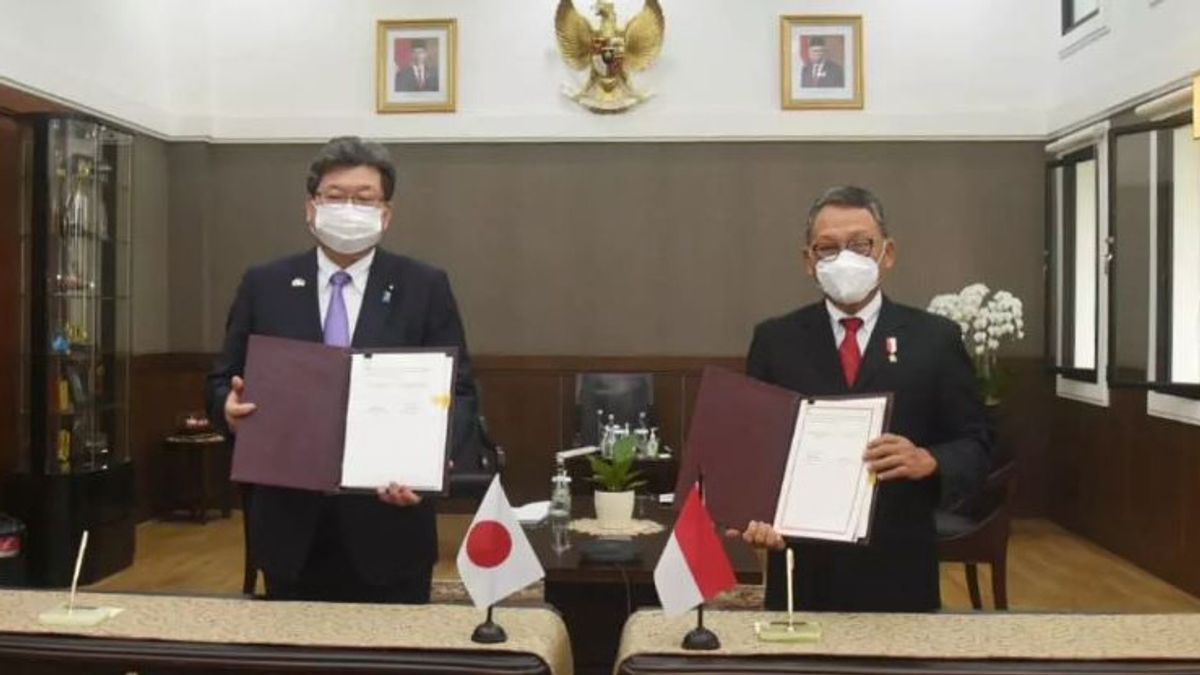JAKARTA - The Indonesian government through the Minister of Energy and Mineral Resources (ESDM) Arifin Tasrif signed a Memorandum of Cooperation (MoC) on the "Realization of Energy Transitions" with the Japanese Minister of Economy, Trade and Industry (METI) Hagiuda Koichi on Friday today, Monday January 10th.
In his official statement, Arifin said that the signing was intended to facilitate energy cooperation between the two parties to realize the energy transition.
"Thank you for the initiative to implement this cooperation and the signing of the MoC. This is of course an extraordinary effort from the Japanese side," said Arifin after signing the MoC at the Heritage Building of the Ministry of Energy and Mineral Resources, Jakarta.
Arifin added that the implementation of the energy transition in Indonesia needs support from international partners for the target of achieving Net Zero Emissions (NZE) in 2060.
"We invite the participation of investors so that they can support the Indonesian program. Some of the policy tools we have implemented are to provide ease of doing business and prepare a Draft Regulation of the Minister of Energy and Mineral Resources related to EBT tariffs," he explained.
Arifin admitted that the energy sector will certainly face big challenges in the future. There is still a tendency for high dependence on fossil energy. The existence of this collaboration is expected to be a technology transfer process in order to realize the acceleration of the energy transition.
"Indonesia and Japan can jointly develop Carbon, Capture, Utilization, and Storage (CCUS) technology by utilizing natural resources in Indonesia," said Arifin.
Meanwhile, the Japanese Minister of Economy, Trade and Industry (METI), Hagiuda Koichi, welcomed the cooperation to help accelerate the achievement of the energy transition process in Indonesia.
"Japan wants to help realize this target through the framework of the Asia Energy Transition Initiative," said Haguida.
The details of the cooperation agreed in the MoC, namely the preparation of an energy transition roadmap towards net-zero emissions based on their respective national targets, the development and deployment of technologies that contribute to a realistic energy transition, including hydrogen, ammonia fuel, carbon recycling, and CCS. /CCUS, supports efforts in multilateral fora to accelerate technological cooperation that contributes to a realistic energy transition, and support for policy development, human resource development, and knowledge sharing on energy transitions and the technologies used.
At the technical level, a joint study is currently underway between Mitsubishi Indonesia Representative and the Research and Development Center for Oil and Gas "LEMIGAS" regarding co-combustion of ammonia fuel in PLTU. The study, which is scheduled to be completed in January 2022, aims to assess the technical and economic feasibility of using ammonia to partially substitute coal so that the operational life of the power plant can be maintained.
"I am pleased to say that Japan has become an important partner for Indonesia's journey towards the energy transition. With real support, we believe in achieving NZE 2060, while maintaining energy security, access, and affordability," concluded Haguida.
The English, Chinese, Japanese, Arabic, and French versions are automatically generated by the AI. So there may still be inaccuracies in translating, please always see Indonesian as our main language. (system supported by DigitalSiber.id)












